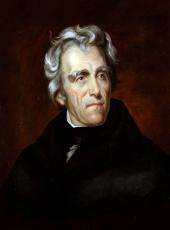HERMITAGE, August 7, 1836 .
C. A. HARRIS, Esq.,
Acting Secretary of War. SIR: I reached home on the evening of the 4th, and was soon surrounded with the papers and letters which had been sent here in anticipation of my arrival. Amongst other important matters which immediately engaged my attention was the requisition of General Gaines on Tennessee, Kentucky, Mississippi, and Louisiana. Believing that the reasons given for this requisition were not consistent with the neutrality which it is our duty to observe in respect to the contest in Texas, and that it would embarrass the apportionment which had been made of the 10,000 volunteers authorized by the recent act of Congress, I informed Governor Cannon by letter on the 5th instant that it could not receive my sanction. The volunteers authorized by Congress were thought competent, with the aid of the regular force, to terminate the Indian war in the South and protect our western frontier, and they were apportioned in a manner the best calculated to secure these objects. Agreeably to this apportionment, the volunteers raised in Arkansas and Missouri, and ordered to be held in readiness for the defense of the western frontier, should have been called on before any other requisition was made upon Tennessee, who has already more than her proportion in the field. Should an emergency hereafter arise making it necessary to have a greater force on that frontier than was anticipated when the apportionment was made, it will be easy to order the east Tennessee brigade there. All the volunteers under the act are engaged for one year's service, unless sooner discharged. Taking this view of the subject, I regret that as soon as the War Department had information of the requisition made by General Gaines it had not at once notified the governors of the States that the apportionment of the volunteers at first communicated to them would not be departed from, and that of course those in the States nearest to the scene of threatened hostility would be first called on.
I had written thus far when your letter of the 26th of July last, accompanied by one from General Wool of the 15th of July and one from General Towsen of the 25th of July last, was handed to me. The letter from General Wool was unexpected. His guide was the requisition on the State, and I can not well imagine how he could suppose that the Department would authorize a greater number of troops to be mustered and paid than he was specially directed to receive. He was apprised fully of the apportionment which had been made of the 10,000 volunteers, and of the considerations which induced us to require 1,000 from Florida, 2,000 from Georgia, 2,000 from Alabama, and 2,500 from Tennessee. This force was designated in this manner because it was in the country nearest to the Seminoles, Creeks, and Cherokees, and in like manner near the force designated for the western frontier, except a fraction of about 430 men to be hereafter selected when it should be ascertained where it would be most needed. It is therefore unaccountable to me why General Wool would receive and muster into the service a greater number than has been called for and placed under his command, particularly as he knew that Tennessee had already been called upon for more volunteers than her proportion in the general apportionment. He knows that the President can only execute the law, and he ought to have recollected that if the officers charged with the military operations contemplated by the law were to use their own discretion in fixing the number of men to be received and mustered into the service there could be no certainty in the amount of force which would be brought into the field. His guide was the requisition upon Tennessee for 2,500, and he should never have departed from it.
The brave men whose patriotism brought them into the field ought to be paid, but I seriously doubt whether any of the money now appropriated can be used for this purpose, as all the volunteers authorized by the act of Congress have been apportioned, and the appropriations should be first applicable to their payment if they should be ordered into the field. All that we can do is to bring the subject before the next Congress, which I trust will pass an act authorizing the payment. Those men obeyed the summons of their country, and ought not to suffer for the indiscretion of those who caused more of them to turn out than could be received into the service. The excess would have been avoided had the governor of Tennessee apportioned his requisition to each county or regiment, so as to make the proper number. This, however, can now only be regretted. I can not approve the mustering or reception into the service of the excess further than it may have been done to secure them hereafter the justice which it will be in the power of Congress to extend to them. They ought to be paid for their travel and expense to, at, and from the place of rendezvous, and Congress will doubtless pass the necessary law. Their promptness in tendering their services and equipping themselves for the field is a high evidence of patriotism, and deserves the thanks of their country.
I shall inclose a copy of this letter to General Wool, and write to the governors of Kentucky, Mississippi, and Louisiana to withhold for the present the quota called for under General Gaines's requisition, and if they are concentrated to muster and discharge them and wait for further orders.
I am, yours, respectfully,
ANDREW JACKSON.
Andrew Jackson, Executive Order Online by Gerhard Peters and John T. Woolley, The American Presidency Project https://www.presidency.ucsb.edu/node/201796

